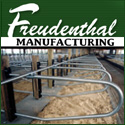 |
 |

|
|
|
Michigan Ag News Headlines |
 |
What Happens to Surplus Salmon After Egg-Take Efforts?
Michigan Ag Connection - 09/21/2018
Michigan's seasonal salmon runs are a busy time for DNR fisheries staff. During the runs, large numbers of chinook and coho salmon return to their native streams to spawn, and afterward they die.
The DNR maintains several sites (weirs) to block these fish and then collect their eggs and milt (sperm) for use in state fish hatcheries.
"Egg collection is one of the most important things we do to support an ample, healthy salmon population," said Aaron Switzer, manager of the DNR's northern Lower Peninsula hatcheries. "But once our egg-take needs are met, the salmon in prime physical condition are available for sale to the public."
When fall salmon runs are done and egg collection is completed, Switzer said that people will be able to purchase the surplus salmon from a small number of retailers in the northern Lower Peninsula. These are fish that have been harvested by the DNR at weirs in the same area.
The preparation and sale are handled by American-Canadian Fisheries, a private vendor that assists the DNR with the salmon harvest.
ACF harvests the salmon for human- and pet-food markets, as well as excess eggs for bait and caviar markets. ACF pays the DNR a flat per-pound rate for the salmon and eggs collected, and then makes suitable-quality fish available wholesale to distributors who market the fish. This year's retailers are located in the northern Lower Peninsula.
Interested in purchasing some of the surplus salmon? The DNR recommends directly contacting individual retailers to confirm the timing and pricing of a purchase.
For more information, contact Aaron Switzer, 231-325-4611, ext. 15 or Elyse Walter, 517-284-5839.
|
 |


|
 |
|
Copyright © 2024 - Farms.com. All Rights Reserved. |
 |
|